Trump’s Tariff Authority Under Scrutiny: Supreme Court Signals Potential Limits
A surprising challenge to presidential power may be brewing at the Supreme Court, as justices signaled skepticism toward the sweeping tariff authority wielded by former President Donald Trump. During oral arguments Wednesday, several justices, including conservative appointees Neil Gorsuch and Amy Coney Barrett, questioned the legal basis for Trump’s imposition of tariffs, suggesting a potential rebuke of executive overreach.
Justices Probe Breadth of Presidential Power
The case centers on the legality of tariffs imposed by Trump, which critics argue exceeded the authority granted to the president by Congress. The heart of the matter lies in whether the president has unchecked power to enact tariffs based on national security concerns. Justices on both sides of the ideological spectrum appeared concerned about the potential for abuse. Gorsuch and Barrett, in particular, raised pointed questions about the scope of presidential discretion, hinting at a willingness to side with the court’s liberal justices. Chief Justice Roberts also appears likely to side against Trump.
A Departure from Recent Court Rulings?
A ruling against Trump’s tariff policies would mark a significant departure from the court’s recent track record of deferring to the former president’s authority. The Supreme Court has, in the past, faced accusations of being overly deferential to the executive branch. A decision limiting presidential tariff power would be viewed by many as a reassertion of the court’s role as a check on executive power.
Implications for Trade and Presidential Power
The outcome of this case could have far-reaching implications for international trade and the balance of power between the executive and legislative branches. A ruling against Trump could embolden Congress to reassert its authority over trade policy, while also setting a precedent for limiting presidential power in other areas. Three justices are expected to side with Trump, but the majority appears to be in favor of striking down the tariffs.
In conclusion, the Supreme Court’s scrutiny of Trump’s tariff authority suggests a potential shift in the court’s approach to executive power. The justices’ questioning of the legal basis for the tariffs signals a willingness to challenge presidential overreach, with potentially significant consequences for trade policy and the balance of power in Washington.
Based on materials: Vox





